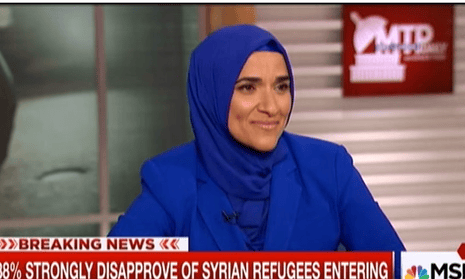There is an insistent call for Muslims to condemn Isis. (I’ll come back to that groupist description in a moment).
The Sun’s leading article a week ago (17 November) began: “Here is a simple way for Muslims to denounce the monsters of IS: march through London in massive numbers with placards saying ‘not in our name.’”
It argued that Muslims had “done too little in public to express solidarity with the victims in Paris and the civilised, tolerant democracies in which they live and which IS want to destroy.”
A day later, the Muslim Council of Britain (MCB) took out an advert in the national press, backed by 300 affiliate organisations, which “unreservedly” condemned the Paris attacks.
The MCB’s secretary general, Dr Shuja Shafi, said it was “important that our fellow Britons hear this message loudly and clearly”.
But some fellow Britons, including politicians and journalists, did not seem to get the message. They demanded yet greater public instances of Isis being rejected by Muslims living in Britain.
And a similar deaf ear to widespread rejection of Isis - this New York Times round-up is a fine example - has been evident also in the United States, where the issue is being debated through the prism of the arrival of Syrian refugees.
Two Republican presidential candidates - Donald Trump and Ben Carson - have been particularly vocal. Trump has suggested American Muslims should be registered by their faith. Carson likened Syrian refugees to “rabid dogs”.
But should Muslims - there’s that groupist designation again - really have to apologise for Isis by making a great show of it?
Dalia Mogahed, research director at the Institute for Social Policy and Understanding in Washington, an organisation that seeks to amplify the voices of American Muslims, has answered that question with a cogent “no”.
During an interview on MSNBC, she was asked whether more Muslim leaders should speak out against Isis. Here’s her reply:
“I think we should take a step back and ask a different question, which is: ‘Is it justified to demand that Muslims condemn terrorism?’ Now that might sound a little radical even asking it. The reason I say that is this.
Condoning the killing of civilians is, to me, about the most monstrous thing you can to do. And to be suspected of doing something so monstrous, simply because of your faith, seems very unfair.
Now when you look at the majority of terrorist attacks in the United States, according to the FBI, the majority of domestic terror attacks are actually committed by white, male Christians.
Now that’s just the facts. When those things occur, we don’t suspect other people who share their faith and ethnicity of condoning them. We assume that these things outrage them just as much as they do anyone else. And we have to afford this same assumption of innocence to Muslims.
This strikes me as a brilliant rebuttal of the demand that Muslims should be required to speak out. Of course, there are other ways of making the argument.
Take this tweet by someone called Kash Ali (as reported on Vox):
“I don’t understand why non Muslims think we British Muslims can stop Isis, mate I can’t even get a text back from the girl I like and you expect me to stop a terrorist organization ffs.”
But let me come back to the constant references in so many newspaper headlines and editorials to “Muslims” and my contention that this is, for want of a better term, groupism or group think.
Muslims do not form a united, homogenous entity. We would never think of referring to Christians in a similar way because we are aware that the catch-all description is virtually meaningless.
What’s more, is it not blindingly obvious that it smacks of bigotry to blame an entire group of people numbering in their multi-millions for the actions of a misguided minority who falsely claim some kind of religious purity?
British newspapers calling for a special response from Muslims also seem to overlook the fact that more Muslims have died at the hands of Isis than non-Muslims.
The Sun, also under attack for its flawed poll alleging that one in five British Mulsims sympathise with jihadis, is in real danger of inciting anti-Muslim sentiment. It is not too late for it to stop and think about the consequences of its editorial line.

